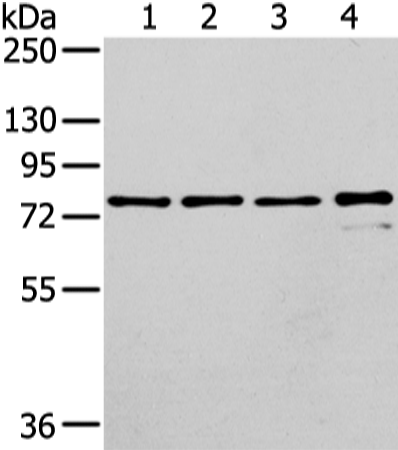
| WB | 咨询技术 | Human,Mouse,Rat |
| IF | 咨询技术 | Human,Mouse,Rat |
| IHC | 咨询技术 | Human,Mouse,Rat |
| ICC | 技术咨询 | Human,Mouse,Rat |
| FCM | 咨询技术 | Human,Mouse,Rat |
| Elisa | 1/2000-1/5000 | Human,Mouse,Rat |
| Aliases | GHBP; GHIP |
| WB Predicted band size | 72 kDa |
| Host/Isotype | Rabbit IgG |
| Antibody Type | Primary antibody |
| Storage | Store at 4°C short term. Aliquot and store at -20°C long term. Avoid freeze/thaw cycles. |
| Species Reactivity | Human, Mouse, Rat |
| Immunogen | Synthetic peptide of human GHR |
| Formulation | Purified antibody in PBS with 0.05% sodium azide and 50% glycerol. |
+ +
以下是3篇关于GHR抗体的代表性文献概览(注:内容基于公开研究整理,非实时引用):
---
1. **文献名称**:*Monoclonal Antibody Targeting the Growth Hormone Receptor: A Novel Therapeutic Approach for Breast Cancer*
**作者**:Mulligan et al.
**摘要**:研究开发了一种靶向GHR的单克隆抗体,通过阻断生长激素信号通路,抑制乳腺癌细胞增殖和转移,动物模型显示显著肿瘤缩小。
2. **文献名称**:*Structural Basis of Growth Hormone Receptor Activation by Monoclonal Antibodies*
**作者**:Zhang et al.
**摘要**:利用冷冻电镜解析GHR与不同单克隆抗体的复合物结构,揭示了抗体通过结合受体胞外域调控信号传导的分子机制,为优化抗体药物设计提供依据。
3. **文献名称**:*A High-Affinity Anti-GHR Antibody for Hormone Deficiency Diagnosis*
**作者**:Somers et al.
**摘要**:报道了一种高亲和力GHR抗体的开发,用于ELISA检测人血清中生长激素受体水平,临床验证显示其在诊断生长激素缺乏症中的潜在应用价值。
---
如需具体文献来源,建议通过PubMed或Sci-Hub输入标题或作者名检索全文。
Growth hormone receptor (GHR) antibodies are tools used to study the structure, function, and signaling pathways of the growth hormone receptor, a transmembrane protein critical for mediating the effects of growth hormone (GH) in target tissues. GHR belongs to the cytokine receptor superfamily and activates intracellular signaling cascades, primarily the JAK2-STAT5 pathway, upon GH binding. This receptor plays a key role in growth regulation, metabolism, and cellular differentiation.
Antibodies targeting GHR have been developed for both research and clinical applications. In research, they help detect GHR expression in tissues, elucidate receptor-ligand interactions, and investigate dysregulation in conditions like Laron syndrome (a GH insensitivity disorder), cancer, or metabolic diseases. Monoclonal and polyclonal antibodies are commonly used in techniques such as Western blotting, immunohistochemistry, and flow cytometry.
Clinically, anti-GHR antibodies have therapeutic potential. For example, blocking antibodies may inhibit excessive GH signaling in acromegaly or certain cancers where GH pathways contribute to proliferation. Conversely, antibodies mimicking GH action are explored for treating growth disorders. However, challenges include ensuring specificity to avoid off-target effects and optimizing pharmacokinetics.
The development of GHR antibodies has advanced understanding of GH biology and opened avenues for targeted therapies, though their clinical translation requires careful evaluation of efficacy and safety profiles.
×